Report on Sophia University’s UN Weeks June 2024
The 21st Sophia University United Nations Weeks June,2024 was held from June 7 to 24 under the concept of “Thinking about the world and our future through the work of the United Nations.” A total of seven diverse programs were developed.
Visas for Life, the Spirit of the United Nations, and the Commitment of the Netherlands
On the 7th, the Royal Netherlands Embassy and Sophia Institute for Human Security of Sophia University jointly hosted a lecture by Mr. Theo Peters, Minister Plenipotentiary of the Royal Netherlands Embassy, on “Visas for Life, the Spirit of the United Nations, and the Commitment of the Netherlands.
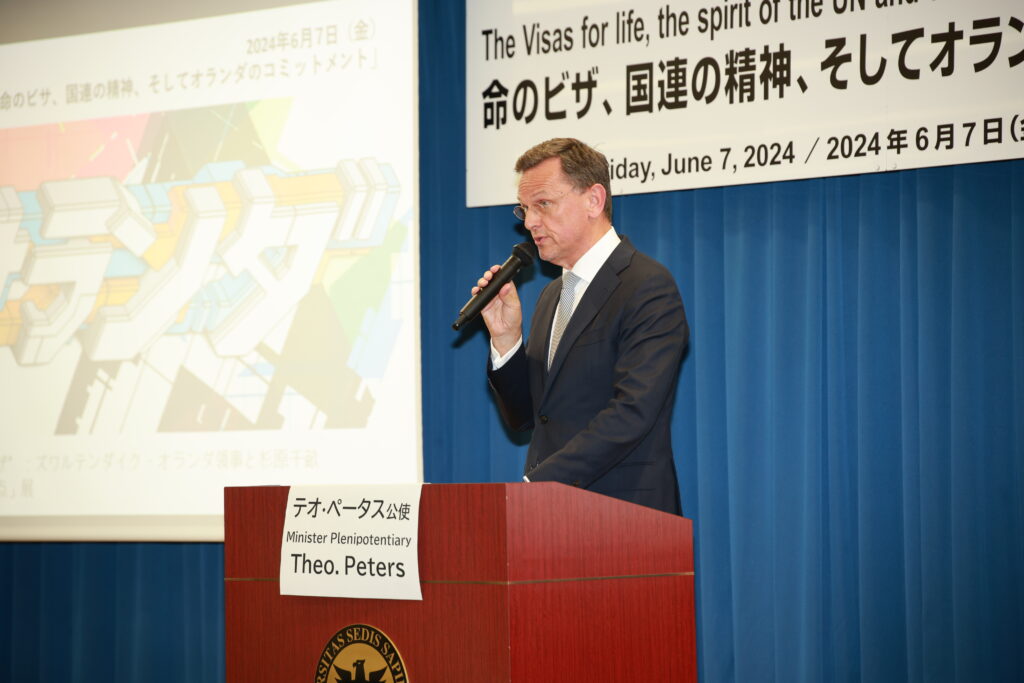
The lecture was opened by Professor Ken Aoki, Director of Sophia Institute for Human Security at Sophia University, who spoke about Jan Zwartendijk, Dutch Consul in Kaunas, who, together with Japanese Consul Chiune Sugihara, issued the “Visa for Life” during World War II and rescued thousands of Jewish refugees. He also spoke about Jan Zwartendijk, Dutch Consul in Kaunas, who rescued thousands of Jewish refugees.
At the time, Mr. Zwartendijk was an honorary consul of the Netherlands living in Lithuania, and as Jews in Lithuania fleeing persecution by Nazi Germany were in danger, he issued a “Curacao Visa,” a fake destination visa, to the Dutch island of Curacao in the Caribbean Sea, since no entry visa was required there. Based on that destination visa, Mr. Chiune Sugihara was able to issue Japanese transit visas, known as “life visas,” to many Jews. Although Mr. Zwartendijk’s existence was not widely known, a book published by a Dutch author in 2016 shed light on his achievements, and 47 years after his death, he was awarded the Medal of Honor, the highest honor bestowed by the royal family on a civilian.
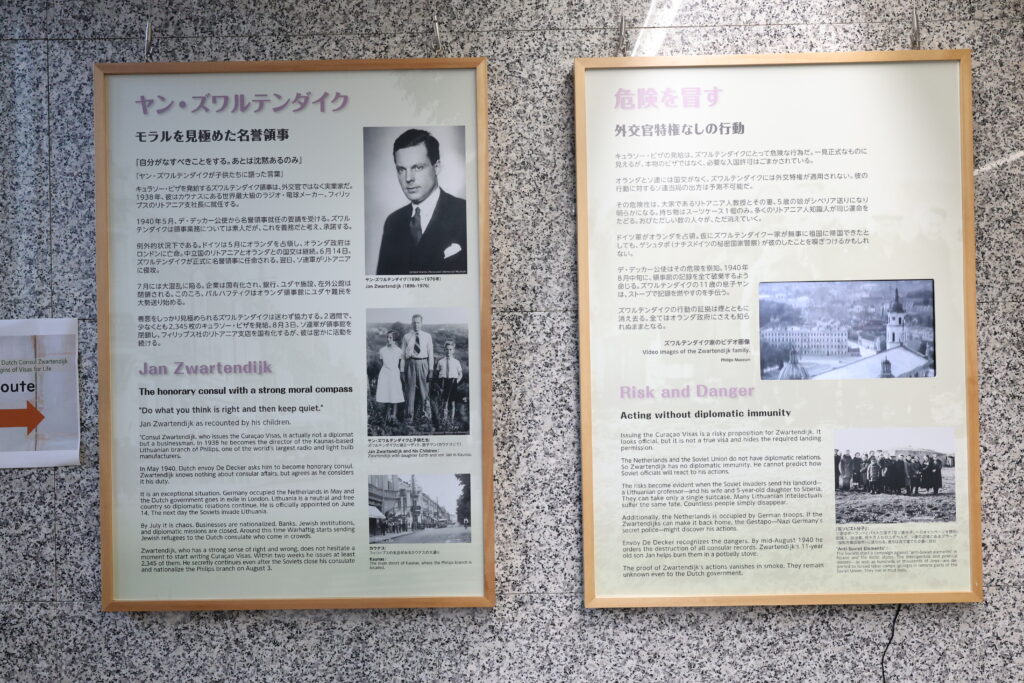
The lecture also included an episode of inviting one of the survivors to Japan for the first time in 82 years for the exhibition “Dutch Consul Zwartendijk and the Unknown Origin of the ‘Visa for Life’” held at the Dutch Embassy in February this year, and an introduction of a support program for Dutch prisoners of the Japanese army during World War II to overcome the past. The lecture also included an introduction of a support program for Dutch POWs who were taken prisoner by the Japanese during World War II.
During the Q&A session in the second half of the lecture, participants asked questions such as “How should we, the younger generation, have the courage to show our morality?” and “I am interested in the work of diplomats. What makes a minister proud of his job?” How can we fulfill our high level of self-sacrifice?” The questions continued to pour in, including “How can we fulfill our high level of self-sacrifice?” In conclusion, the legate asked the audience to think about the situation that is happening in the world. He asked the participants to think about what they are passionate about and what they can do to contribute to solving the problems.
Concurrently, a photo panel exhibition, “Curacao Visa: Dutch Consul Zwartendijk and Sugihara Chiune’s ‘Visa for Life’ Origins,” was held in the entrance hall of Building No. 2 on the Yotsuya Campus from July 7 to 24, 2012. Many people stopped to look at the stories of empathy for those in need, which convey an important message for us today.
Considering Middle East Peace
On January 10, a high-flex symposium was held on the theme of “Considering Middle East Peace,” inviting three experts with deep knowledge of Middle East issues as lecturers. The moderator was specially-appointed professor Yasuhiro Ueki, director of the Human Resources Center for International Cooperation. With the attack on Israel by the Islamic organization Hamas on October 7, 2011, and Israel’s retaliation, the realization of peace in the Middle East has become even more distant. The three experts looked back at history, analyzed the current situation, and discussed in what way this Middle East peace will be realized in the future.
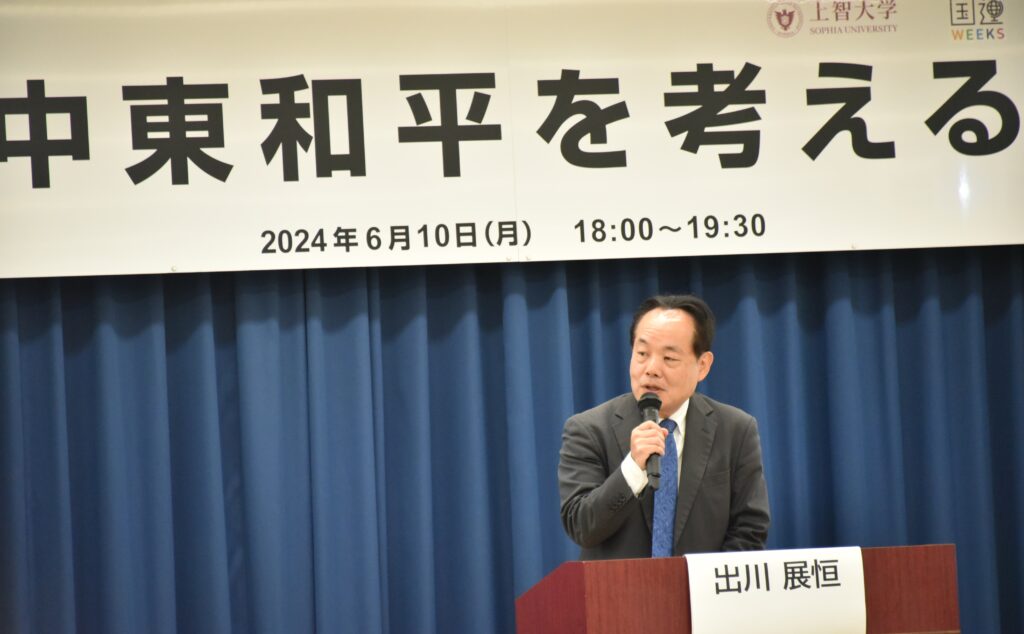
The first speaker was Nobuhisa Degawa, current NHK commentator, who served as the first correspondent and station chief of NHK’s Jerusalem Bureau. Mr. Degawa explained the latest developments in the current war in the Gaza Strip, including the new proposal for a permanent ceasefire from Israel to Hamas that was announced by US President Biden on May 31, and the reasons why it is difficult to agree on a ceasefire, from the perspective of Israeli Prime Minister Benjamin Netanyahu. He also discussed the two states of Israel and Palestine, and the difficulties of reaching a ceasefire. He also expressed his opinion that the Palestinian problem will probably never be solved unless the coexistence of two states, Israel and Palestine, is realized.
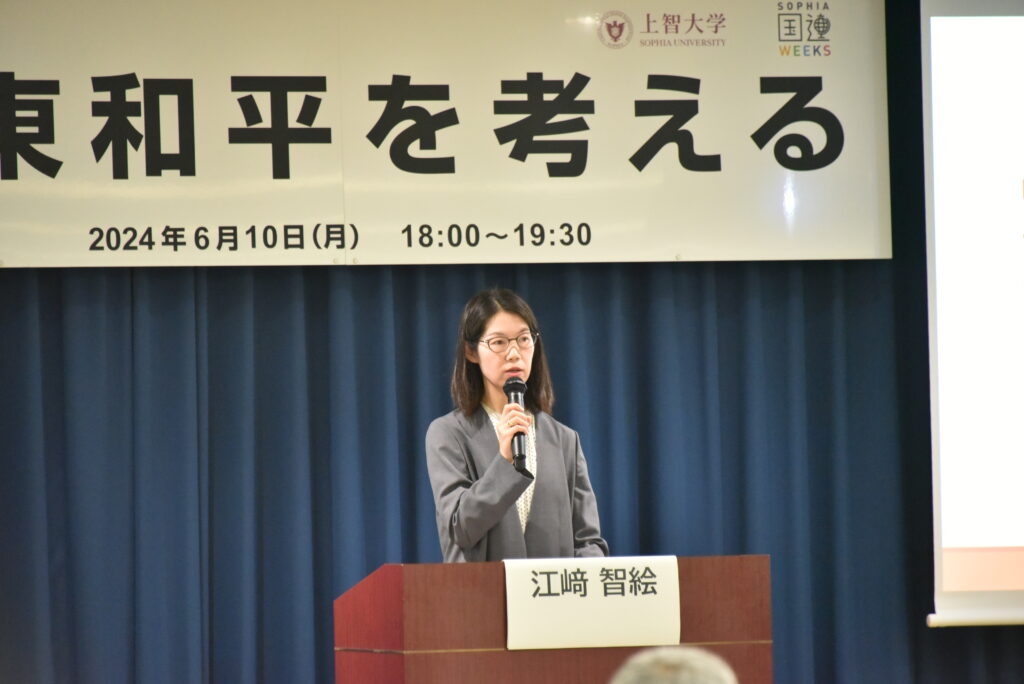
The next speaker was Associate Professor Chie Ezaki of the National Defense Academy’s Graduate School of Integrated Security Studies, who specializes in international relations in the Middle East and Palestinian issues. Prof. Ezaki explained that the motivation behind Hamas’ attack on Israel was the movement to normalize diplomatic relations between Israel and Saudi Arabia. She said that the Palestinian issue, which has been called the central issue in the Middle East region, has lost its cause, and that the Middle East peace through a multilateral framework of normalization of diplomatic relations between Israel and Arab countries has been prioritized. In this context, he expressed his belief that only by incorporating bilateral negotiations between Israel and Palestine can an environment conducive to the resolution of the Palestinian problem be created.
The final speaker was Professor Kazuhiro Maeshima of Faculty of Global Studies, who is an expert on U.S. domestic and foreign policy issues. Professor Maeshima stated that the Israel issue is an internal American affair, and that within the United States, support for Israel is overwhelmingly strong. He stated that in addition to the fact that the U.S. is the largest Jewish state in the world and that there are many dual citizens of Israel and the U.S., the background of support is the American sense of redemption against Jews and the existence of Christian evangelicals. He also explained that although there is an Israel boycott movement in American universities, youth turnout is low and the Palestinian-Israeli war is not a key issue in the November presidential election. He expressed skepticism that the U.S. will end this war. The symposium concluded with participants asking a variety of questions about the role Japan can play in the current situation in Israel and Palestine.
JICA’s Peacebuilding Challenges – with a view to collaborating with international organizations
On June 11, “JICA’s Challenges in Peacebuilding – with a view to collaborating with international organizations” was held to discuss Japan’s role in peacebuilding, and was attended by about 170 people in person and about 230 people online, for a total of nearly 400 participants. This event was one of a series of seminars that Professor Daisaku Higashi of the Center for Global Education and Discovery has been conducting since 2016 on the theme of “Human Security and Peacebuilding.
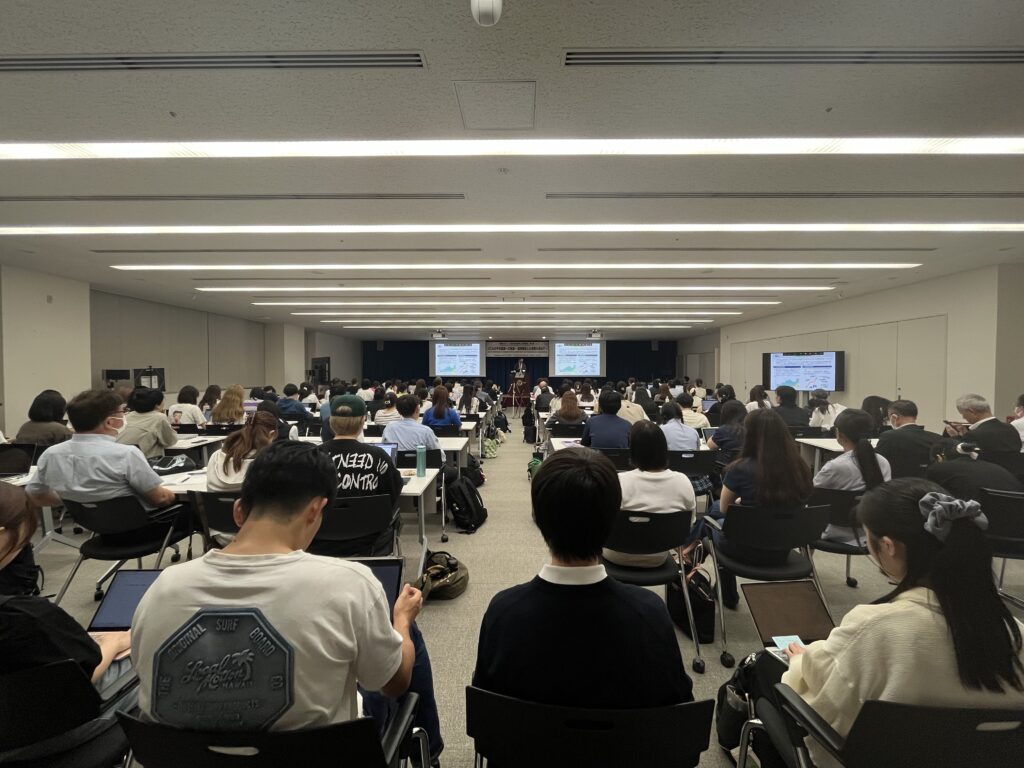
The event opened with opening remarks by Sali Augustine, Chancellor of Sophia School Corporation, and Naoki Ando, Director of the Japan International Cooperation Agency (JICA), who oversees peacebuilding activities in Africa and around the world, took the podium. Presenting data on the state of conflict in the world, he introduced the current situation in which responses to issues such as peacebuilding and human security are becoming increasingly complex. Next, he explained the assistance provided in Ukraine, Gaza, and Africa, using specific examples. He then expressed his hope that many of the participants were willing to face international issues through this event, given the declining support for the field of international cooperation among the Japanese public, especially among young people, and added, “In international cooperation, it is important to think from the other party’s perspective in order to win their trust. He concluded his speech with an enthusiastic exhortation to the participants in the audience: “When you participate in international cooperation in the future, I hope you will understand the historical background of the partner country and engage in polite dialogue with the government and citizens.
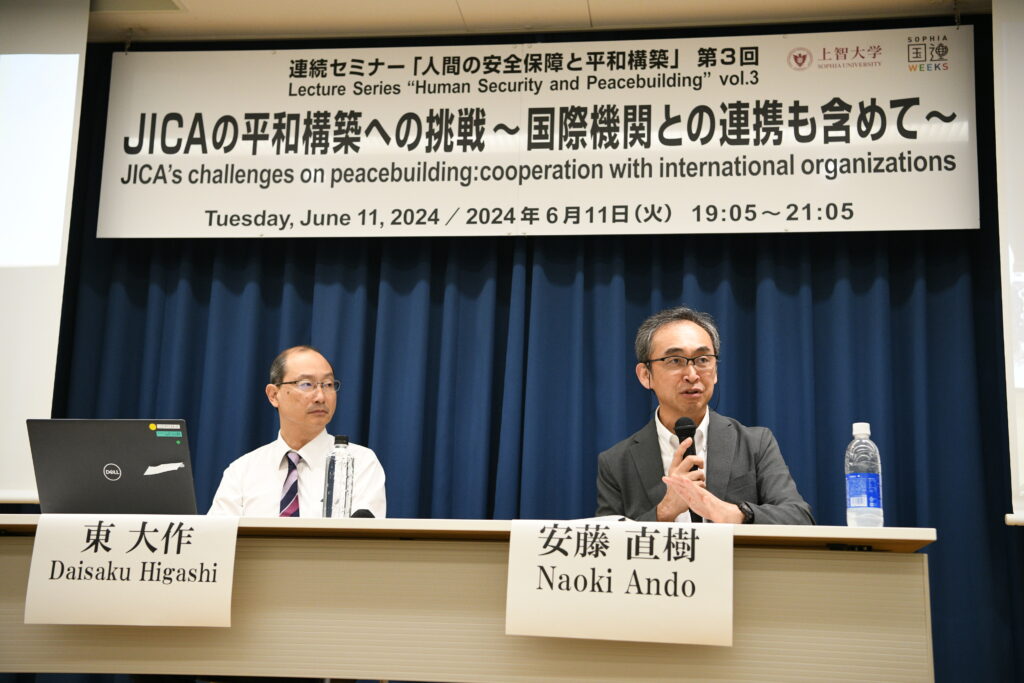
In the second half of the seminar, a panel discussion was held to answer questions from the participants. Questions related to the factors that led to the prolonged conflict and the possibility of peacebuilding between Ukraine and Russia were asked, and Mr. Ando, together with Professor Higashi, answered each one in detail.
Professor Higashi concluded the seminar on a high note, noting that after Russia’s invasion of Ukraine, the UN Security Council has become increasingly divided, making it difficult to mediate peace under conflict and to build peace after conflict. The seminar ended on a high note.
Career Workshops on International Organizations and Cooperation
On the 18th, a career workshop was held for those who aspire to careers in international organizations and the international cooperation field. At the beginning of the workshop, the moderator, Professor Yasuhiro Ueki, Director of Human Resources Center for International Cooperation, introduced today’s speakers.
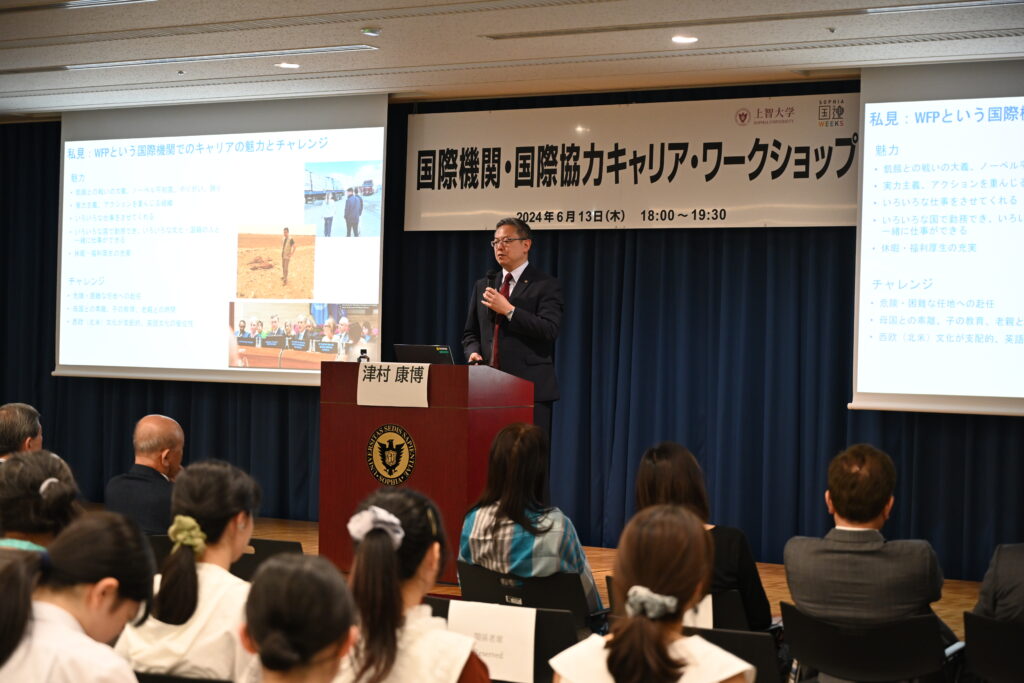
In his keynote speech, Mr. Yasuhiro Tsumura, the representative of the United Nations World Food Programme (UN WFP) Japan Office, gave an overview of global food insecurity and the UN WFP, and then spoke from his own experience, saying, “Although there are many challenges, such as being posted to dangerous areas, it is challenging and rewarding to work for an organization that values meritocracy and concrete action in the cause of fighting hunger. He then explained the appeal of a career with WFP, an international organization, from his own experience. He continued, “Whether you work in the private sector or for an NGO, I hope you will first increase your work experience. All roads lead to Rome. If you have the desire to do something, it will lead you to the right path.” He encouraged participants who aspire to work for international organizations or in the field of international cooperation.
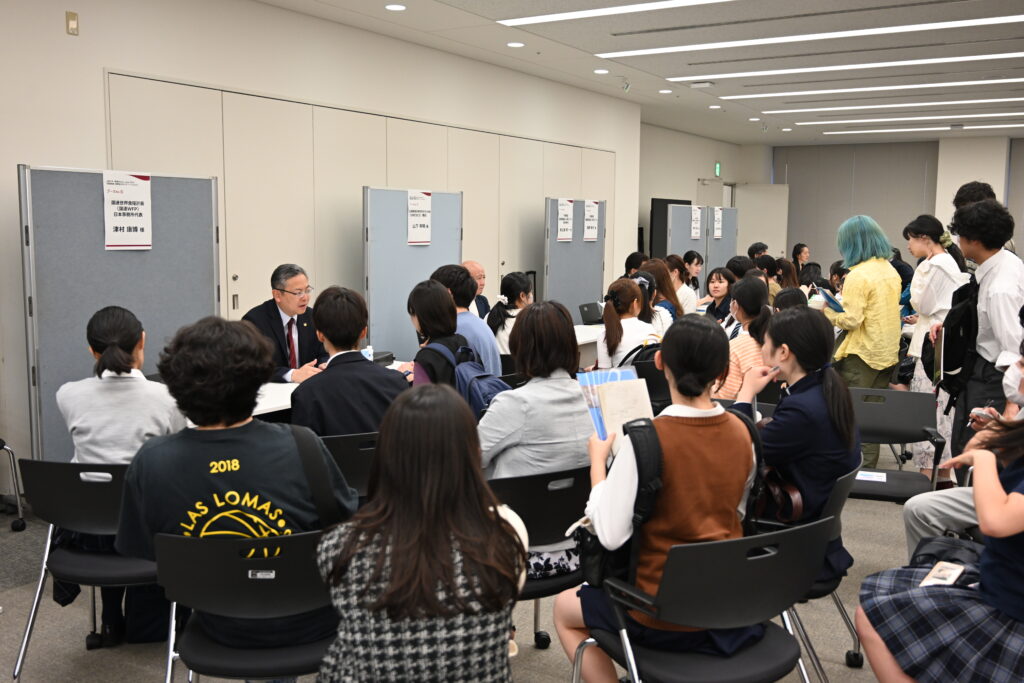
In the latter half of the workshop, students and high school students were seen eagerly asking about careers and the appeal of jobs at the various booths.
Climate Change: Facing a Global Challenge
A symposium on “Climate Change: Facing a Global Challenge” was held on January 18 to discuss responses to climate change, including global warming, and was attended by about 230 people both in person and online. Professor Yasuhiro Ueki, Director of Human Resources Center for International Cooperation, moderated the symposium and discussed actions needed to achieve the SDGs with experts who are conducting research at international organizations.
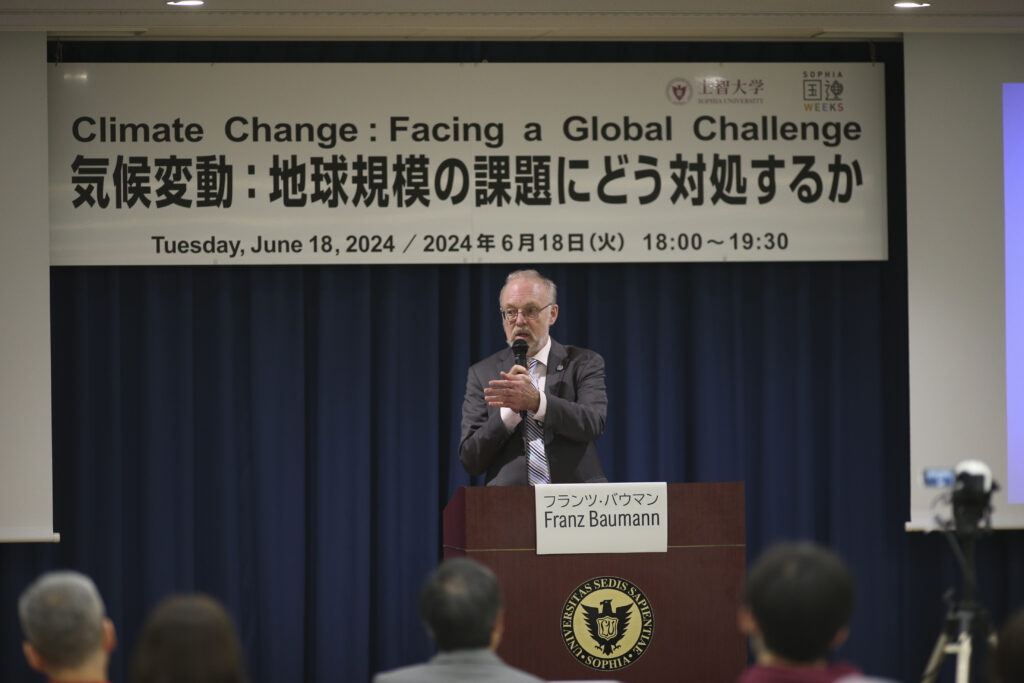
In his keynote address, Franz Baumann, the incoming president of the Academic Council of the United Nations System (ACUNS), warned against the optimistic attitude toward climate change by presenting data showing that “global warming is progressing much faster than we realize, threatening human civilization and the future itself. He sounded a warning against the optimistic attitude toward climate change.
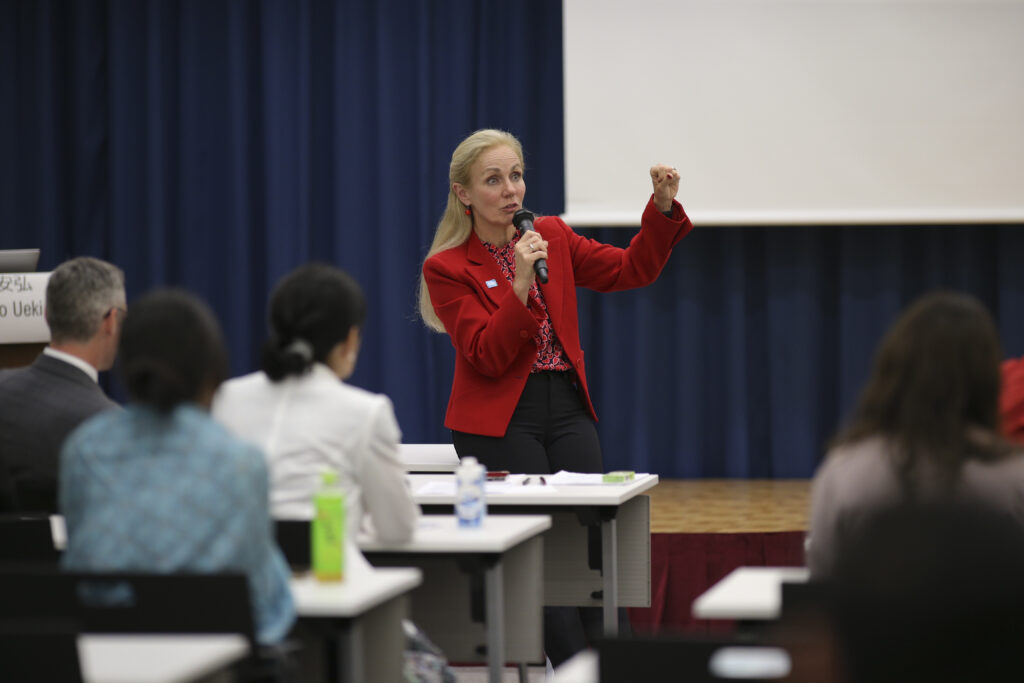
Individual presentations followed, including those on the serious impact of climate change on children, the effects on low-lying island nations, and frequent flooding, with participants nodding their heads as they listened to the perspectives from their respective fields of expertise.
The audience asked questions such as “In the absence of a systematic agreement at the respective levels of the UN, governments, businesses, and citizens, what can be done to strengthen their respective actions? A lively exchange of opinions took place between the speakers and participants. Professor Ueki concluded the event by saying, “Let’s work together to address climate change issues by first considering what we can do as individuals, forming partnerships with those around us, and lobbying governments as well.
Academic Council of the United Nations System (ACUNS) Annual Conference Human Development Session
The Academic Council for United Nations System (ACUNS) Annual Conference Session was held at the Komaba Campus of the University of Tokyo on April 22, and the keynote speech at the session, coordinated by Professor Yasuhiro Ueki, Director of Human Resources Center for International Cooperation, was held as a UN Weeks program.

“The Human Development: open-ended and open-armed”, the presentation pointed to “Beyond GDP” as a key phrase in reading the Human Development Report. Beyond Income“, which makes visible multidimensional poverty and customary discrimination caused by non-economic issues; ”Beyond Averages“, which focuses on economic and social polarization and gender disparities; and ”Beyond Short-Term Perspectives”, which focuses on short-term perspectives and the impact of the report on the world. Beyond the short-term perspective (Beyond Today), the Planetary Pressure (the pressure humans exert on the Earth) is quantified and added to the Human Development Index (HDI) to create a vision of the future world, including the health of the Earth. The report also discusses the current status and challenges in each item.
He concluded his speech by saying that the recent turbulent global situation, climate change, and uncertainties brought about by rapid technological change have caused people to feel insecure, leading to a lack of trust and ultimately political division, as evidenced by the global decline in HDI and polarization of the figures since 2019, and called for collaboration, saying, “As the title of today’s speech As the title suggests, human development is a never-ending journey, and UNDP and the Human Development Reporting Office will continue to work with all agencies to seek a better development future,” he said, calling for collaboration. After the lecture, numerous questions were received from the audience and online, and the event closed on a high note.